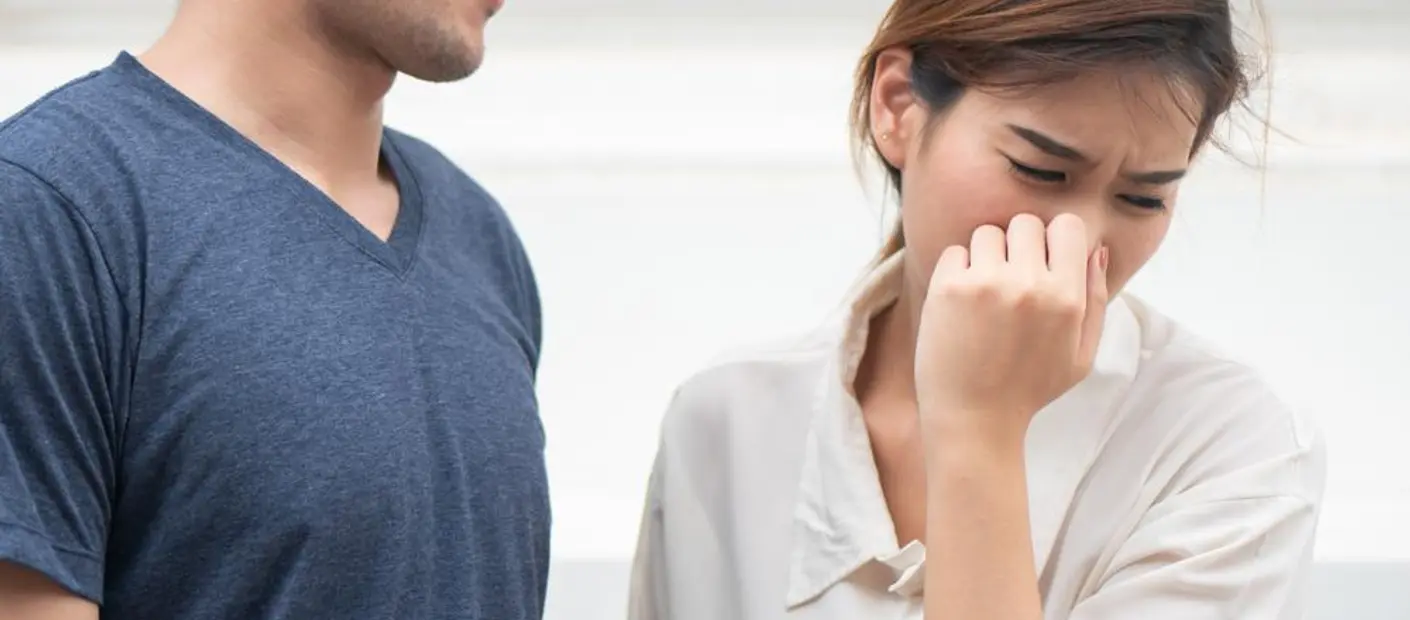
Fear Not—There’s Help for Bad Breath and Body Odor
by Stephanie Blanchard
Like most humans, you have likely experienced bad breath and body odor at some point in your life. Morning breath, smelly pits, and stinky feet are not exactly what you’d mention on an online dating profile. However, these and other embarrassing odors don’t discriminate, so at least we don’t have to feel alone in our embarrassment! But, they can still cause our confidence levels to take a big hit.
That’s why people make buying personal care products a priority. I was curious to see just how much money we spend on products to keep us smelling fresh. Turns out, we collectively spend a ton of money on products that prevent (or claim to prevent) bad breath and body odor. The global deodorant and antiperspirant market is worth over, and the global oral hygiene market is worth over $44 billion.
Yeah, I did a double-take when I saw “billions,” too.
After finding out how big these hygiene industries are, I wanted to know just when the whole craze over covering up body odor began.
It turns out that humans have been using fragrance on their bodies for thousands of years. Ancient Egyptians were ahead of the game when they invented perfume. They used essential oils to create ointments and balms that are simpler than many perfumes we see on shelves today. The fragranced aroma of perfume soon came to mean status for those who wore it.
Before the 19th century, people in the United States handled body odor by washing stinky parts more frequently and wearing perfume to mask smells. If underarm sweat stains were a concern, people sewed absorbent cotton pads into the sleeves of their shirts and dresses. Deodorants that masked odor came out by the end of the 19th century, but those products did not block sweat.
I get that body odor is a turn-off, but when did sweating get such a bad rep? After all, perspiration regulates our body temperature.
The Sticky History of Antiperspirants
Once I dug into how antiperspirant came to be an essential product in the U.S., I couldn’t believe how strange and even contrived its beginnings were! Antiperspirant first rose to popularity in 1920s America, and it was because people were scared into buying it.
The story goes back to the 1900s when a Cincinnati doctor created a liquid to prevent his hands from getting sweaty on the job. His daughter tried this antiperspirant on her underarms and liked that it kept her pits dry. They called the antiperspirant Odorono… “Odor–Oh, no!” (Yep, just like it sounds!)
She tried to sell the concoction to her friends, but it didn’t go so well. After she hired an advertising firm, the product took off. The ad writer targeted women and their insecurities to sell the product. Why just women, you ask? Because back then, it was okay for men to stink. Their body odor was considered “masculine.” Can you sense my eye roll?
Printed advertisements were as long as newspaper articles back then, and people actually read them. The ad for Odorono presented a fictional character named Mary. No one wanted to hang out with her because she had terrible body odor but didn’t know it. It gets worse for Mary. She couldn’t find a husband because of the way she smelled. (Imagine if this ad came out today...)
People didn’t talk about perspiration or any bodily fluids back then—they were taboo. None of Mary’s friends were brave enough to tell her that she smelled terrible. Essentially, Odorono’s advertising convinced women that they needed to wear antiperspirants because they may be sweating and not even know it!. The ad struck a chord with ladies who didn’t want to risk social rejection, and antiperspirants took off.
Not long after, more brands of antiperspirants popped up, and, eventually, men’s insecurities were targeted as well. The ads induced fear in men, convincing them that their offensive odor would get them fired from their jobs. This sealed the deal for antiperspirants to become a household staple.
But many years after body odor became a mass concern, people are still anxious about it ruining their social and love lives.
When Bad Breath Became a Medical Condition
Bad breath has long been considered a killer of romantic relationships and one’s social life, even for the ancient Egyptians.
Like antiperspirants, products targeting bad breath surged in popularity in the 19th century. At the time, advertising campaigns presented unpleasant breath as a health concern, in part by intentionally using a medical-sounding term to describe it, called “halitosis.”
In the 1930s, mouthwash companies launched aggressive ad campaigns that prompted people to become fearful of having bad breath. Halitosis must be avoided, or you risk losing friends and potential mates!
Body Odor and Bad Breath Have the Same Cause
Bacteria is a major culprit for both kinds of stink, with a couple of caveats. Some health conditions can cause bad breath, body odor, or both. And certain foods can change the way we smell. I’m looking at you, onions and garlic.
What Causes Bad Breath?
Bacteria live inside our mouths, and those buggers feed on food particles to create bad breath.
However, not all the bacteria inside your mouth contribute to bad breath. Some of it is good bacteria that neutralize the bad.
Gum disease can also cause odor because it affects the teeth and gums. It’s triggered by poor oral hygiene, though medical conditions such as diabetes, acid reflux, and some metabolic diseases can contribute to bad breath as well.
The way our breath smells can also tell us about our health. Fruity smelling breath can be a sign of high blood sugar. Breath that smells like acetone can be a symptom of kidney disease.
Another common culprit of bad breath is dry mouth. The condition can lead to halitosis because saliva clears away dead skin cells and neutralizes acid in the mouth. Tobacco products and salivary gland conditions can contribute to dry mouth. It’s also a side effect of some medications. Tonsil stones, or tonsil sloths, are another cause of bad breath. These whitish-yellow deposits occur when food particles get trapped in the tonsils with bacteria, producing a foul odor.
What Can Prevent Bad Breath?
First and foremost, good oral hygiene can help prevent bad breath and tonsil stones. Good dental care, like remembering to brush and floss after meals, reduces bacteria’s food supply and curbs odor.
Mouthwashes, especially antiseptic ones, can help kill the odor-causing bacteria and stop halitosis. You can also find special mouthwashes and lozenges for alleviating dry mouth. Oral probiotics may help some people with their oral health issues. I’ve seen probiotic lozenges in my local health food store that claim to increase the good bacteria in your mouth. If you are still experiencing bad breath after trying home remedies, it’s best to see your doctor for help.
What Causes Body Odor?
Bacteria on your skin feed off of bodily fluids like sweat, urine, menstrual blood, and semen. As a result of this reaction, odor forms. Feet, armpits, private parts, and anywhere we have bodily fluids can be a source of body odor due to this same process.
What Can Prevent Body Odor?
Many of us deal with armpit odor by applying antiperspirant or deodorant, with varying results. Antiperspirants combat body odor by clogging sweat glands with aluminum to reduce sweating.
Deodorants don’t block sweat. They usually work by masking odors and may contain ingredients that can irritate skin.
If you’re on the hunt for a deodorant that is made with skin loving ingredients and really PREVENTS body odor, Lume Whole Body Deodorant is for you. It’s the only deodorant I’ve tried that works for me, and I’ve tried MANY deodorant brands.
If you want added protection from odor in between showers, try Lume Deodorant Wipes. They are clinically proven to control odor for 24 hours and are super convenient to use. Just a little swipe under your arms, under skinfolds, private parts, and feet, and you’ll be funk-free at a moment’s notice.
Lume Deodorant and Lume Deodorant Wipes contain ingredients that actually prevent bacteria from combining with bodily fluids to cause odor. So really, that makes Lume more of a pre-odorant than a deodorant when you think about it!
It All Comes Down to Good Hygiene & the Right Products
When it comes to body odor and bad breath, thankfully there are remedies! With some good personal hygiene to remove odor and Lume to prevent it, you’ll be unstoppable.
The only problem with smelling this good? The next time you go in for a hug, people might not let go.
Did you Lume today?
Categories
Recent Articles
- Meet Our New Clinical Strength Antiperspirant Spray
2026-02-05T21:00:00.000Z
- The Art of Scent Layering With Lume
2025-09-24T20:51:28.831Z
- Your Pits Deserve Better: Why Lume is The Best Deodorant For Underarms
2025-08-08T14:01:16.861Z
- Bacteria On Our Skin: Friend Or Foe?
2025-07-17T19:53:50.363Z
- Why Lume's Premium Ingredients Deliver Quality & Real Value
2025-06-20T15:57:17.551Z









